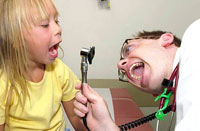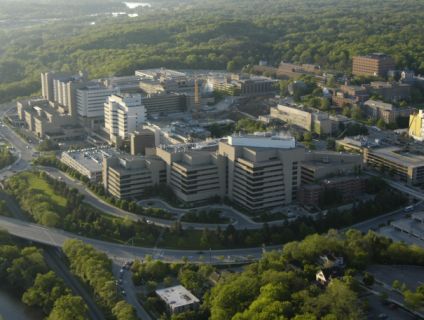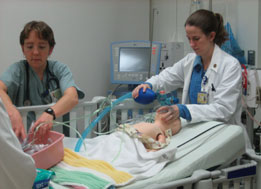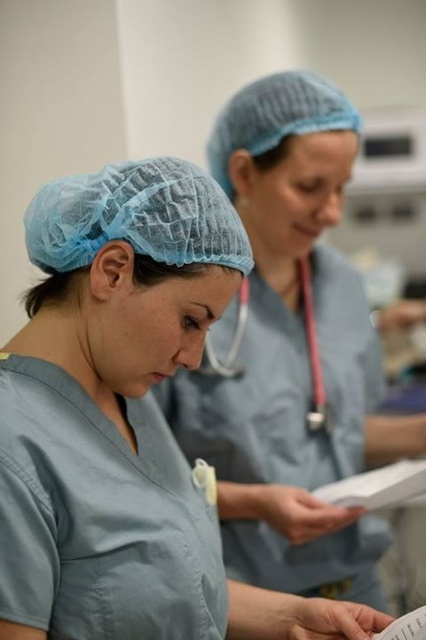Health Professionals
Contact Information
Patients & Families:
For further information or any questions you may have, please contact Pediatric Critical Care's Administrative Assistant, Ashley Felstow.
| Ashley Felstow Administrative Assistant Pediatric Critical Care Medicine 1500 E. Medical Center Drive F6790 Mott, Box 5243 Ann Arbor, MI 48109-5243 Office: (734) 936-1494 afelstow@med.umich.edu | Mike Quasney, MD, PhD Division Director Pediatric Critical Care Medicine Department of Pediatrics and Communicable Diseases University of Michigan Medical School Office: (734) 764-5302 mquasney@med.umich.edu |
Fellowship:
For further information or any questions you may have, please contact the Fellowship Program Director, Dr. Timothy Cornell, or the Fellowship Coordinator, Pam Borton.
Pam Borton
| Timothy Cornell, MD Fellowship Program Director Pediatric Critical Care Medicine Office: (734) 764-5302 ttcornel@med.umich.edu |
| Mary Dahmer, PhD Associate Fellowship Program Director for Research Pediatric Critical Care Medicine Office: (734) 764-5302 mkdahmer@med.umich.edu | Tsovinar Arutyunyan, MD Associate Fellowship Program Director for Education Pediatric Critical Care Medicine Office: (734) 764-5302 tarutyu@med.umich.edu |
Education
FELLOWSHIP
The University of Michigan Pediatric Critical Care Fellowship is an ACGME accredited program that offers comprehensive training in pediatric critical care and whose aim is to train the future leaders of pediatric critical care. Our clinical program is superb, with all pediatric subspecialty services represented as well as internationally recognized pediatric cardiothroacic surgery and ECMO programs. Fellows also have access to a wide range of mentors both within and external to the division to pursue scholarly interests spanning from basic science, to translational, clinical, educational research. Opportunities exist to obtain additional training in Health Services Research, Clinical Research Design and Statistical Analysis, and Health Professional Education; all have opportunities for granting Masters Degrees. Please see the fellowship tab for further details.
RESIDENCY
 Pediatric residency at the University of Michigan is a large program that offers superb clinical training in general pediatrics with exposures to virtually all pediatric subspecialties. Graduates of the program have been very successful in obtaining fellowships and positions throughout the country as general pediatricians. More information about the residency program can be obtained here.
Pediatric residency at the University of Michigan is a large program that offers superb clinical training in general pediatrics with exposures to virtually all pediatric subspecialties. Graduates of the program have been very successful in obtaining fellowships and positions throughout the country as general pediatricians. More information about the residency program can be obtained here.
MEDICAL SCHOOL
 Consistently ranking among the top ten medical schools in the United States, the University of Michigan medical school is internationally renowned. Medical students routinely rotate through the pediatric critical care unit, offering their unique insight as well as opportunities for residents and fellows to teach. More information about the medical school can be found here.
Consistently ranking among the top ten medical schools in the United States, the University of Michigan medical school is internationally renowned. Medical students routinely rotate through the pediatric critical care unit, offering their unique insight as well as opportunities for residents and fellows to teach. More information about the medical school can be found here.
Fellowship Detail
ABOUT THE FELLOWSHIP
The Pediatric Critical Care Medicine Training program at the University of Michigan is committed to training leaders in academic critical care. It is an ACGME fully accredited program.
C.S. Mott Children's Hospital is a quaternary children's hospital and is recognized as one of the leading pediatric hospitals in the country. It provides the full spectrum of pediatric primary and subspecialty care. The majority of fellow training occurs in the Pediatric Intensive Care Unit (PICU). The PICU is a 30 bed state of the art unit providing care to a wide range of critically ill and injured children. The unit serves patients from general medicine, general surgery, transplantation, trauma, neurosurgery, otolaryngology, orthopedics, and plastic surgery, among others. In addition, the unit also enjoys a national reputation for expert care in extracorporeal membrane oxygenation (ECMO). Additional training occurs in the Pediatric Cardiothoracic Unit (PCTU). The PCTU is a 30 bed unit that provides care for patients with a full spectrum of cardiovascular disease. Fellows also have access to a wide range of mentors both within and external to the division to pursue scholarly interests spanning from basic science, to translational, clinical, educational research. Opportunities exist to obtain additional training in Health Services Research, Clinical Research Design and Statistical Analysis, and Health Professional Education; all have opportunities for granting Masters Degrees.
The quality of our graduates is unparalleled as evidenced by data from annual in-service training exams, the Critical Care Board Scores, the fellowship match, and the competitiveness of graduates for positions following training here. Past graduate fellows have gone on to become division directors, unit directors, co-directors, or fellowship directors at Duke, San Antonio, Seattle, Tulane, The University of Arizona and The University of Cincinnati.
The program is three years in duration and is under the direction of Timothy Cornell, MD.
CURRICULUM
FIRST YEAR
First year fellows spend approximately 6-7 blocks (24-28 weeks) in the PICU, gaining a foundation in the clinical care of critically ill children as well as gain experience in the care of trauma and burn patients in the adult unit. A "crash course" over the first month, consisting of faculty lectures, provides a core knowledge base while experiences in the simulation center provide advanced airway, vascular access skills and variety of code simulations. In addition, early on in the year, four weeks are spent in anesthesia gaining advanced airway experience as well as skills with vascular access and sedation. An additional 4 week block is spent in the PCTU, learning the basics of care for patients with a wide range of cardiovascular disease including postoperative management of complex congenital heart disease. 2-3 blocks (8-12 weeks) are provided to explore and establish a research project. Finally, time is also spent with the pediatric palliative care team and with cardiac catheterization and echocardiography. Four weeks is allotted for vacation.
SECOND YEAR
Second year fellows spend approximately 4 blocks (16 weeks) in the PICU and an additional four weeks in the PCTU and adult trauma/burn unit, solidifying their clinical skills and knowledge base. Significant time is provided for research and an additional four weeks for vacation. Fellows are encouraged to participate in national conferences like Pediatric Academic Societies (PAS) and the Society of Critical Care Medicine (SCCM). Fellows at this level are expected to train as PALS instructors and teach at least twice a year.
THIRD YEAR
Third year fellows spend approximately 3 blocks (12 weeks) in the PICU and an additional four weeks in the PCTU, with significant autonomy in leading rounds and supervising the ICU team. The ICU team includes junior fellows, residents, and medical students. Extensive time is spent completing research as well as preparing for the transition to an attending position. Elective time is available to pursue activities such as an additional month in the PCTU or a transport elective with our survival flight team.
RESOURCES
- Custer's Core Curriculum
CONFERENCES
 Weekly fellow conferences include case conferences, attending didactics, journal clubs, research conferences, and morbidity and mortality conferences. Fellows also participate in weekly pediatric cardiology conferences. In addition, the division participates in several joint conferences throughout the year with the divisions of pediatric surgery, pediatric emergency medicine, and adult critical care.
Weekly fellow conferences include case conferences, attending didactics, journal clubs, research conferences, and morbidity and mortality conferences. Fellows also participate in weekly pediatric cardiology conferences. In addition, the division participates in several joint conferences throughout the year with the divisions of pediatric surgery, pediatric emergency medicine, and adult critical care.
Finally, fellows also have access to the University of Michigan's state of the art Simulation Center, which provides opportunities for hands on experience with resuscitation, advanced airway and vascular access skills, as well as bronchoscopy.
SAMPLE SCHEDULE (Split into thirteen four-week blocks per year) (Sample from 2011-2012 Schedule)
| First Year | |
| PICU | 6-7 blocks |
| PCTU | 1 block |
| Anesthesia | 1 block |
| Research | 2-3 block |
| Cardiac Cath/Echo and Palliative Care | 0.5 and 0.5 blocks |
| Burn/trauma (adult unit) | 1 block |
| Vacation | 1 block |
| Second Year | |
| PICU | 4 blocks |
| PCTU | 1 block |
| Burn/trauma (adult unit) | 1 block |
| Research | 6-7 blocks |
| Vacation | 1 block |
| Third Year | |
| PICU | 3 blocks |
| PCTU | 1 block |
| Research | 8 blocks |
| Vacation | 1 block |
RESEARCH
Each fellow receives extensive research experience to enable them to perform successfully in a research-oriented, academic medical center at the completion of training. Fellows have a diverse range of interests and have access to the considerable resources available at the University of Michigan to pursue these interests. Recent fellow projects have included bench work investigating the immunology of sepsis, health services research examining patients requiring long term mechanical ventilation, clinical work looking at the development of trust between physicians and patient families, as well as medical education developing a curriculum for bedside ultrasound.
Interdisciplinary research is also available with the Institute for Social Research, Department of Pathology, the Extracorporeal Life Support in animal laboratories, and the newly established immunobiology core program housed in a state-of-the-art research facility. Fellows are also eligible to participate in programs in molecular and cell biology as well as health services research supported by NIH T-32 Training grants.
CURRENT FELLOWS
For a list of our current and incoming Fellows, please go here.
Living in Ann Arbor
Built on the banks of the Huron River and located 45 minutes west of downtown Detroit, Ann Arbor is a cultural mecca within the Midwest basin. It is home to the University of Michigan – one of the finest universities and premier health systems in the country - and offers a unique blend of city sophistication and small town charm that appeals to students and professionals, singles and families, newly born and newly retired, alike. It is both ethnically diverse and culturally rich. Just one visit and you will quickly understand why Ann Arbor is consistently voted one of the best places to live in the United States and voted one of America's Most Livable Cities in 2010.
Ann Arbor offers a stimulating cultural environment, albeit with the conveniences of a small town. It consistently ranks among the nations top ten places to live as well as having an excellent school system, diverse recreational opportunities, and is only 25 minutes from the Detroit Metropolitan Airport.
Whether you are coming here for medical care, considering attending the U-M Medical School or thinking about living in the area or working for the U-M, the resources below provide a closer look at what Ann Arbor has to offer.
Visiting Ann Arbor
- Ann Arbor Convention and Visitors Bureau
- Ann Arbor Flip Book
- Ann Arbor Transportation Authority
- Arborweb
- MGoBlue: University of Michigan Athletics
- University Musical Society
- Michigan Theater
Attending U-M/Living & Working in Ann Arbor
- City of Ann Arbor
- Mlive: Ann Arbor
Michigan Weather
- Video: Eric Wilson, meteorologist from WDIV on Michigan Weather
Awards and Accolades
- #13, "Top 100 Best Places to Live" - Livability, 2015
- #2, "Best Cities For Singles" – Kiplinger Online, 2014
- #6, "Happiest Cities in America" – The Daily Beast, 2014
- #7, "Best Sports Town" - USA Today, 2014
- #1, "Most Educated City in America" - Forbes, 2014
- One of "America's Best Main Streets" - Fodor's Travel, 2014
- #4, "Most Walkable City" - Governing.com, 2013
- #2, "Top 10 College Towns" - Livability, 2013
- #6, "Smartest American City" - VentureBeat, 2013
- #7, "Best Towns in Michigan for Young Families" - NerdWallet, 2013
- #4, "The Country’s Most Well-Read Cities" – Amazon.com, 2012
- #6, "America’s Most Creative Cities" – The Daily Beast, 2012
- #18, “Top 25 Mid-Size Cities for Art” – American Style, 2012
- #3, “Top 10 US Cities for Well-Being” – US News, 2012
- "Top 20 American Vacation Destinations” – Frommers, 2012
- “Ten Best Cities for Families” – Parenting Magazine, 2010
- #1, “Best College Sports Towns” – Forbes Magazine, 2010
- #3, “Best Midwest Food Towns” – Midwest Living, 2009
- “Best Place in Michigan to Raise Your Kids” – Business Week Magazine, 2009
- “Top Five Surprisingly Gay-Friendly Small Towns” – Out Traveler, 2008

SALARY AND BENEFITS
Fellows are automatically enrolled as members of the UM House Officers Association, which negotiates contracts for all house officers, including competitive salaries and comprehensive benefits.
For full details of these benefits, see the UM HOA Contract.
HOW TO APPLY
The Pediatric Critical Care Program participates in the Electronic Residency Application Services (ERAS) Program as well as the NRMP Match Program. Our fellowship is designed to train physicians interested in pursuing an academic career in pediatric critical care medicine. Fellows come from a wide variety of training programs throughout the country with a diverse range of interests.
APPLICATION REQUIREMENTS
- Please apply online through the Electronic Residency Application Service (ERAS). The application system opens on July 1.
- We require that you submit your CV, personal statement, 3 letters of recommendation, Official Medical School Transcript, and USMLE Transcript. All documents should be transmitted through the ERAS system.
- Interviews generally occur in September and October with the match occurring in early November
CONTACT
For further information or any questions you may have, please contact the program director, Dr. Timothy Cornell, the associate program director for research, Dr. Mary Dahmer, or the program coordinator, Pam Borton.
Timothy Cornell, M.D.
Program Director
Pediatric Critical Care Medicine
Office: (734) 764-5302
ttcornel@med.umich.edu
Mary Dahmer, Ph.D.
Associate Program Director of Research
Pediatric Critical Care Medicine
Office: (734) 764-5302
mkdahmer@med.umich.edu
Pam Borton
Administrative Assistant
Pediatric Critical Care Medicine
1500 E. Medical Center Drive
F6790 Mott, Box 5243
Ann Arbor, MI 48109-5243
Office: (734) 764-5302
pborton@med.umich.edu
Patient Care
The University of Michigan Pediatric Intensive Care Unit (PICU) at C.S. Mott Children's Hospital houses 22 beds for children with medical or surgical illnesses requiring the highest level of intensive monitoring or therapy. The PICU provides 24-hour care by a multidisciplinary care team of nurses, respiratory therapists, pharmacists, nutritionists -- all led by board-certified pediatric intensivists, critical care fellows, and pediatric residents. Our PICU enjoys an international reputation for excellence in the care of children with respiratory failure, especially those who require artificial organ support. The intensive care of asthma, increased intracranial pressure, respiratory failure, sepsis, multiple organ failure, nosocomial infections, bereavement, and teamwork are subjects of ongoing research. Nationally recognized programs in artificial organ support with extracorporeal membrane oxygenation (ECMO), hemodialysis and hemofiltration are unique to this critical care unit.
Special services and featured programs include:
- Continuous Renal Replacement Therapies (CRRT)
- ECMO Program
- Family-oriented psychosocial support
- Family visitation
- Inpatient consultation
- Level I Pediatric Trauma Support
- Non-invasive trend recording of physiologic data
- Ongoing Basic Science, Translational, Clinical, and Outcomes Research
- Organ Transplantation Support (heart, liver, kidneys, bone marrow)
- Palliative Care Consultation Service
- State-of-the-art invasive hemodynamic monitoring
- State-of-the-art quality and performance benchmarking
- U-M Survival Flight provides rapid, safe transport services
- Telephone consultation (always available)
Research and Publications
The Faculty in the Division of Pediatric Critical Care Medicine are involved in cutting edge research particularly in the areas of the host immune response in critical illness, hypothermia, epigenetics, ECMO, innovative device technologies, optimization of prehospital transport and patient safety. The Division is one of 7 members of the Collaborative Pediatric Critical Care Research Network (CPCCRN) funded by the National Institute of Child Health and Human Development. They have also been actively involved in the Pediatric Acute Lung Injury and Sepsis Investigators Network (PALISI). Highlights of research in the Division include Dr. Frank Moler (PI: Therapeutic Hypothermia After Pediatric Cardiac Arrest (THAPCA). In addition, Dr. Tom Shanley is the Associate Dean for Clinical and Translational Research.
Tsovinar Arutyunyan, MD
Ryan Barbaro, MD, MSc
Timothy Cornell, MD, FAAP [Publications]
Joseph Custer, MD [Publications]
Mary Dahmer, PhD [Publications]
Rodney Daniels, MD, FAAP
Kevin Kuo, MD
Frank Moler, MD, MS [Publications]
Matthew Niedner, MD [Publications]
Folafoluwa Odetola, MD, MPH [Publications]
Waseem Ostwani, MD
Michael Quasney, MD, PhD [Publications]
Thomas Shanley, MD, FCCM [Publications]
Affiliations
The University of Michigan Pediatric Critical Care Medicine group is committed to team science, national/international research networks, collaborative clinical care, transparency, and dissemination of effective practices. To that end, the division has cultivated a robust set of affiliations, both within and beyond the university.
External:
- Pediatric Emergency Care Applied Research Network (PECARN - http://www.pecarn.org)
- Collaborative Pediatric Critical Care Research Network (CPCCRN - http://www.cpccrn.org)
- Children's Hospital Association - a merger of NACHRI and CHCA (CHA - http://www.childrenshospitals.net)
Internal:
- Michigan Institute for Clinical & Health Research (MiCHR - http://www.michr.umich.edu)
- Child Health Evaluation & Research Unit at the University (CHEAR - http://chear.org)
Outreach
The Division of Pediatric Critical Care Medicine participates in several international outreach activities. For example, Project Shunt has provided neurosurgical services since 1997 to children in Guatemala with neural tube defects. Guatemala has one of the highest incidences of spinal bifida because of dietary issues, genetic predisposition and poor prenatal care. Accomplished with donations and fund raising activities, it provides opportunities for faculty, fellows, and nurses to participate in annual medical missions providing much needed neurosurgical care to children who otherwise would not have access to such care. In addition to performing operations, the group provides teaching to other surgeons, nurses and parents. An important educational objective was to improve the quality of life for children with spinal bifida and train the health care professionals in state-of-the-art management techniques. The team includes Dr. Gail Annich and Dr. Karin Muraszko, MD, Chair and Professor of Neurosurgery.

Additionally, Dr. Rodney Daniels is collaborating with the World Pediatric Project and physicians at Massachusetts General Hospital to help develop critical care services in the Dominican Republic. The Dominican Republic is one of the poorest countries in the western hemisphere and has an infant mortality rate 3x that in the US. A grant was recently submitted to the Rotary International to help fund this project.
Columbia 2015
 | | |

